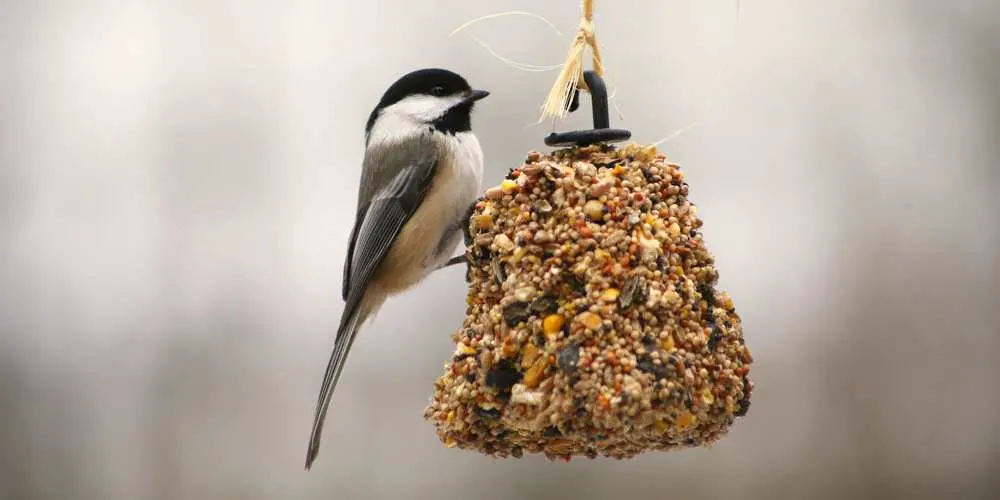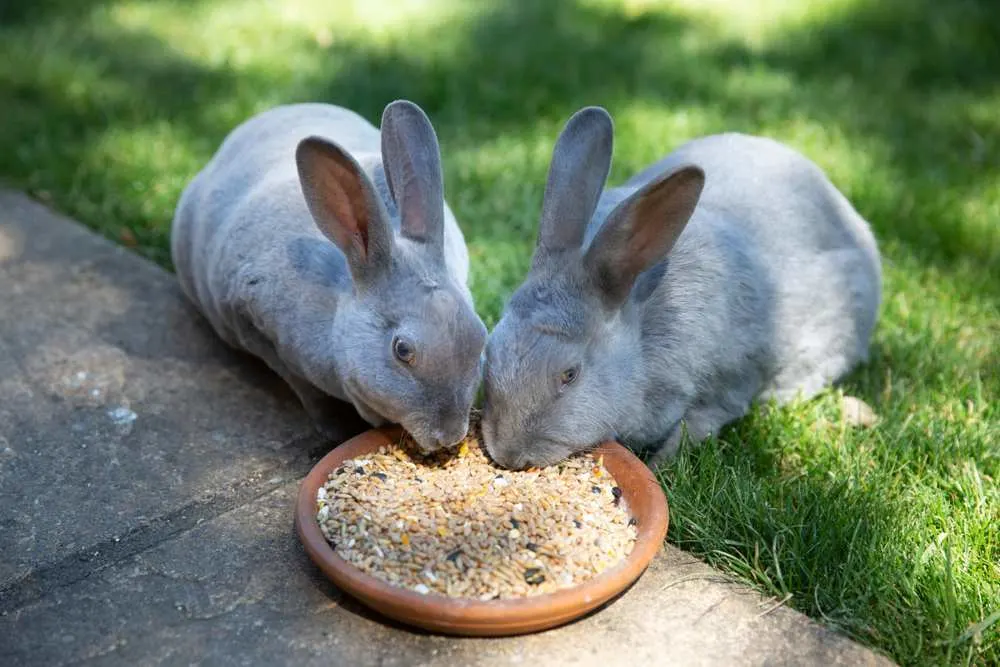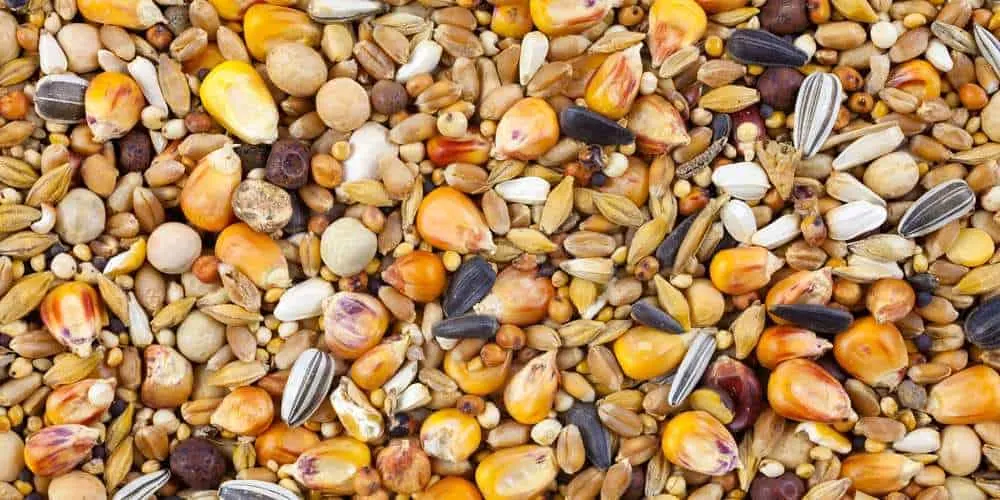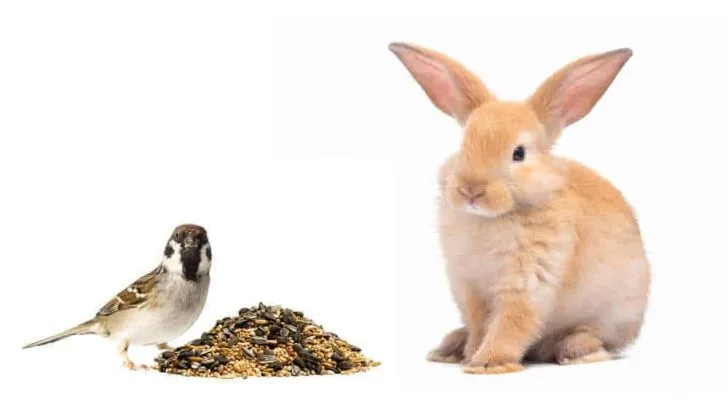If you have a bird, you probably know they are not the tidiest eaters, and if you own a rabbit, you probably know that they will likely eat food that somehow finds its way to the ground. And if you have both a bird and a rabbit, you’ve likely seen your bunny eagerly munching on some loose bird seed.
So, with all of this in mind, it is completely natural and quite responsible to wonder “Can rabbits eat bird seed?”.
I am here to tell you that if your beloved rabbit has enjoyed some bird seeds here and there, there’s nothing to worry about, it most likely won’t harm them! But before you decide to include some leftover bird seeds in your bunny’s diet, here are some things that might make you decide against it after all.
Keep reading to find out!

Birds And Rabbits – Can They Share Something Other Than A Friendship?
Rabbits and birds can be amazing friends, both to people and to each other. Even though they are quite different, many owners have witnessed their furry and feathery pets sharing a lovely bond. But the question is, can they also share food?
As we know, the differences between the species warrant different diets. In order to know whether there is something in your bird’s feed that might benefit or harm your bunny, you need to get familiar with the basics of both rabbit and bird food.
Here are some elementary bits of information on both.
A Rabbit’s Diet – The Basics
Rabbits are herbivores, which means their diet should mostly consist of plant-based options such as hay, grass, vegetables (especially leafy greens), and fruits.
1. HAY
HAY should be a staple, making up 80-90% of a rabbit’s entire diet. The best hay to feed your bunny is grass hay, such as orchard grass, brome, timothy, and oat hay. The reason hay is so important in your rabbit’s diet is that it consists of long fibers, which are vital in keeping your bunny’s gut muscles strong.
Rabbits should have hay available to munch on all throughout the day to maintain happy bowel movements and prevent any blockages. Read Also: Can Rabbits Eat Bermuda Hay?
2. GRASS
GRASS is a good component of any healthy rabbits’ diet for the same reason hay is – fiber. However, when it comes to grass, there are a couple more things you’ll need to keep in mind.
If you have a garden or a backyard that you’ve made available to your beloved bunny, they will be able to munch on it throughout their day. What complicates things is that if your rabbit is not used to eating grass at all or grass in large amounts, they might not react well to it, resulting in an upset stomach.
Additionally, if you do want to feed grass to your rabbit, make sure that it is fresh and that it hasn’t been treated with any chemicals. Also, cut the grass with some scissors to make sure it is fresh. Grass cut with a lawnmower goes through the process of fermentation, which can make your rabbit have an upset stomach.
3. VEGETABLES
VEGETABLES are a great addition to your rabbit’s diet. They can consume a large variety of veggies, so long as they are not rich in carbs (carrots and potatoes for example).
Some of the best vegetables you can feed to your bunny are leafy greens. They are rich in antioxidants, vitamins, and minerals, while also being a wonderful source of hydration for bunnies. A great choice would be romaine lettuce, carrot tops, kohlrabi, mustard greens, and watercress.
Some options for other vegetables rabbits can eat on a daily basis are bell peppers, bok choy, zucchini, cucumbers, brussel sprouts, endive, herbs such as cilantro, oregano, parsley, mint, and basil.
Although there are lots of vegetables that your bunny can enjoy daily, there are also some that you should be more sparing with when giving them. Veggies such as broccoli, kale, spinach, carrots, and collard greens should only be fed to rabbits about once or twice a week.
4. FRUITS
FRUITS are a great way to diversify your rabbit’s diet, but should only be fed in small quantities and occasionally, no more than twice a week.
Some fruits that are fine for your rabbit to enjoy every once in a while include apples (without seeds), cherries (also seedless), bananas, oranges, peaches, berries, grapes, melons, pears, and plums.
The amount of fruit a rabbit can enjoy at a time is two tablespoons per five pounds of body weight. Your bunny should have hay, grass, and some leafy greens and veggies available to snack on all throughout the day, but be careful about diarrhea.
If you are thinking of including new veggies or fruits in your pet’s diet, do so slowly, in small amounts, one at a time, so that you are able to monitor how well they take to it and how well their stomach reacts to each new option. If you include too many at a time, in case they have a bad reaction, it will be difficult to tell what exactly caused it.

Bird Seed – What Is It Actually?
Before we get to the nitty gritty of bunnies and bird seed, it is important to know what is actually in the bird food. Some bird food is more simple in its contents (only two or three ingredients), whilst other are more complex (up to 25 ingredients).
Here is a breakdown of what those ingredients usually are:
Bird food is mostly a mix of small whole or broken grain, but in addition to that, some types of bird seed can also contain dried fruits, peanuts, rice, dried insects, minerals and vitamins, and dried eggs.
SMALL GRAINS found in bird food are usually different kinds of cereals, oil seeds, and other seeds.
| Cereals | Oil Seeds | Other Seeds |
|---|---|---|
| Crushed maize: excellent source of fiber and protein, with a low fat and salt content | Black oil sunflower seeds: give an extra shiny coat; high in calories and fat – ideal for colder months | Pine seeds: high in fat; not toxic or dangerous, but best to avoid to prevent obesity |
| Barley: contains loads of fiber, vitamin C, potassium, and vitamin K – great for rabbits in need of an enhanced nutrition | Safflower seeds: have mild benefits against contractile dysfunction in rabbits with higher cholesterol | Anise seeds: anti-fungal, antibacterial, and anti-inflammatory benefits; keeps blood sugar in check |
| Rice: can cause bloating and stomach ache, and in some cases even gastro-intestinal stasis | White sunflower seeds: insufficient nutrients; shell might be too hard for rabbits to ingest | Mung beans: nutritive values are satisfactory – rabbits can eat them, but not often |
Bird And Rabbit Food – Overlaps?
Now that you know what the majority of bird feed, as well as rabbit food, consists of, you have probably figured out that they have very little in common. While they are both herbivores, rabbits need a diverse diet filled with hay, fruits, and veggies, all high in fiber, and birds mostly eat feed that is made up of seeds.
This is the exact reason why bird feed should definitely not make up a part of a rabbit’s diet. They do not hold the necessary nutrients for a healthy rabbit and some can even cause digestive problems.

Can Rabbits Eat Bird Seed? – The Conclusion
If you own multiple pets of different species, you have probably walked in on one of them somehow getting a hold of the other’s food and carelessly munching on them. It is a reality we have all come to terms with. But that doesn’t mean that the initial worrying about whether something bad will now happen to them, as a result, is now gone.
So, if said pets are a rabbit and a bird, here is the summary of what you need to know in order to wash the worry away!
Both bunnies and birds are herbivores, meaning that their diet is plant-based. However, what they eat on a day-to-day basis is vastly different. Thankfully, that doesn’t mean they are deadly to each other.
Birds mostly eat different kinds of seeds, some of which are more or less harmful to rabbits. While none of them will kill your rabbit, the majority will do more harm than good, especially in larger quantities.
Rabbits need a fiber rich diet in order to keep their gut functioning properly and they also need foods that they can munch on during the entire day, without it causing problems such as obesity or an upset stomach.
For these reasons, it is best if you avoid feeding seeds of any kind to your rabbits. There are much better options if you want to treat your bunny to a nice snack, whilst being sure that you are keeping them healthy.
Now that I have equipped you with all the necessary knowledge, I’ll leave you to your beloved furry and feathery friends. Just keep in mind, some things are better not mixed!


